How to Learn a New Language Efficiently
20 Feb 2023 • 6 min read
Whether you want to learn a foreign language for travel, work, or personal development, it shouldn’t be a daunting task. The key to success is the right frequency of studying sessions and the method you chose.

In this article, we’ll explore the best ways to learn a new language, so you can make the process more manageable and even enjoyable.
Best Ways to Learn a New Language
Now, we want you to forget about how languages are taught at school and concentrate on your feelings and goals.
Let’s explore tips and tricks that can help you learn a new language quickly and effectively.
Set Up Achievable Goals
The first step in any learning process is identifying your goals. You may start with basic questions:
- Why do you want to learn this language?
- Are you trying to travel to a new country, improve your job prospects, or simply challenge yourself?
To make your studying process effective, we suggest you use S.M.A.R.T. goals for creating specific aims. This will help you stay focused and motivated throughout the language journey.
Find a Study Method that Fits You
There are many resources available to help you learn a new language, including books, online courses, tutors, and YouTube videos. At the same time, you need to use a way to study effectively that will suit you and your needs. Consider trying a few resources and study methods to see what works best for you.
Plunge into the Language
As the dictionary says: language is a system of communication consisting of sounds, words, and grammar. So the fastest way to learn a language is to immerse yourself in it as much as possible. The more you surround yourself with the language, the more you'll be able to absorb it and improve your skills.
How can you do it? If you’re a beginner – start to use sticky notes, and try to write your to-do list or product list in a new language. In case you already can understand a foreign language – start listening to music, watching movies, and reading books in the language you're learning. Implementing a foreign language into your daily life will keep you motivated and help you identify gaps in your knowledge.
Be Consistent
We’ve already mentioned that frequency is the key to success. The online language school Lingoda polled its students about their confidence in speaking after completing their courses. For most people, practicing language between 30 minutes and 1 hour a day exposure will provide excellent results.
Whether you attend language classes or learn by yourself — find your golden middle, practice learning a new language every day, get comfortable with how it sounds, and build your confidence in speaking and understanding it.
Find a Study Buddy
Learning with a friend or a group can be a fun and effective way to practice speaking and generally help each other. To start practicing quicker, you may easily use apps such as HelloTalk, Tandem. They are basically created to connect language learners with each other and practice together. You also may consider attending courses or taking part in exchange programs.
No matter in which way you will find your study buddy, the main thing is to interact together, share sources, and useful tips, and even check one another.
Master Language Through Shadowing
Have you ever heard of the shadowing technique? It's a method of language learning where you listen to a native speaker and repeat everything they say, as close to their rhythm and intonation as possible. Here are the main steps:
- Listen to an audio recording of the material you want to learn.
- Repeat what you hear out loud, trying to match the speaker's speed and intonation.
- Gradually increase the difficulty of the material you're shadowing.
By doing this, you'll train your brain to process new vocabulary and grammar structures at a much faster pace. It takes practice, but stick with it, and you'll be surprised at how quickly you can start to sound more naturally and fluently.
Take Advantage of Technology
Technology has made our lives easier than ever, and it also affected language learning. The first thing you may think about is language learning apps, about which we’ve written below. However, have you thought about unlimited access to resources to enhance our abilities? There are countless multimedia resources: starting with books and ending with online exercises.
Just google such queries:
- How to learn [your language] video?
- Podcast about [topic you’re interested in] on [your language]
- [your language] learning app
Best Language Learning Apps
As we’re living in a golden age of learning apps, we’ve listed language learning apps that make it easy for you to learn a language at your own pace.
Duolingo
Duolingo is a free, fun, and effective way to learn a new language. This app makes language learning enjoyable and generates tailored lessons to help you learn at just the right level and pace. The tool has a wide range of languages, including Spanish, French, German, Italian, etc.
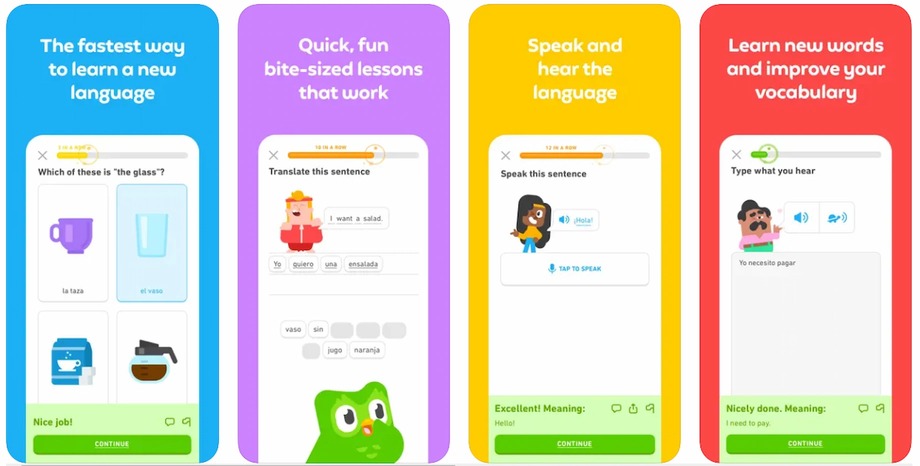
This language learning app you to cover the basic knowledge of the new language. As the app uses a combination of listening, speaking, and writing exercises. Duolingo provides you with dictionaries, contests, podcasts, and stories from real-life situations to practice your skills. Best for: beginners and intermediate learners
Pricing:
- Free: access to all learning content
- Super: $6.99 per month, provides unlimited hearts, unlimited legendary and test outs
- Super Family: $9.99 per month, gives all premium features and faster learning on up to 6 Super accounts.
Memrise
Memrise uses a gamified approach to learning. You can also learn basic-to-advanced details such as numbers, grammar, idioms, and difficult words. The main idea of Memrise is to immerse yourself in the language using a combination of video, audio, and memory exercises, making it an interactive and engaging learning experience. They even give learners the opportunity to create personalized flash cards.
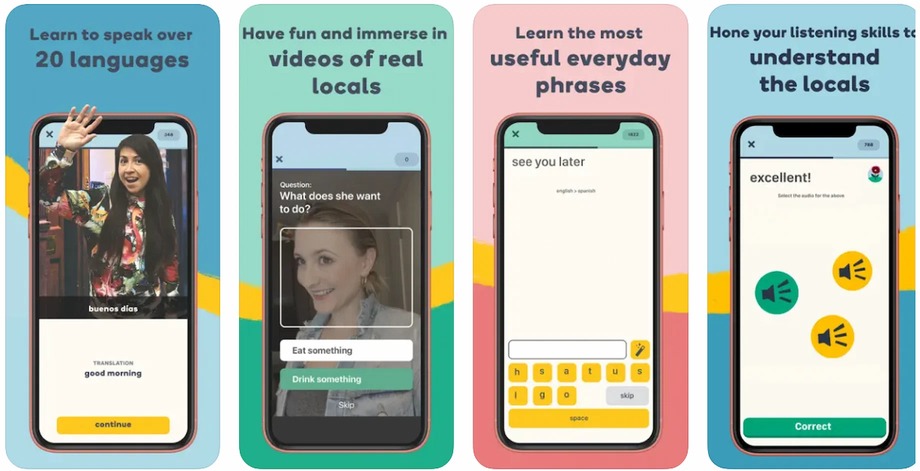
With Memrise, you can make groups where you may invite people to chat about a range of subjects. It also provides "speed reviews" and "classic reviews" to check your understanding of the subject you've learned. The more precisely you engage with new sentences, the bigger the flower representations that represent your progress get.
Best for: fast language learning and a self-study format.
Pricing:
- Free: over 200 language combinations, learning reviews
- Pro: $8.49 per month (also available annual or lifetime payment); grammar bot, pro chats, speed review and more.
Rosetta Stone
Because of immersion-based methodology Rosetta Stone is another popular language learning platform that has a language learning app. It offers 25 languages, including Spanish, French, German, and Italian. The interactive format that Rosetta Stone uses encourages you to keep going until you've finished your courses.
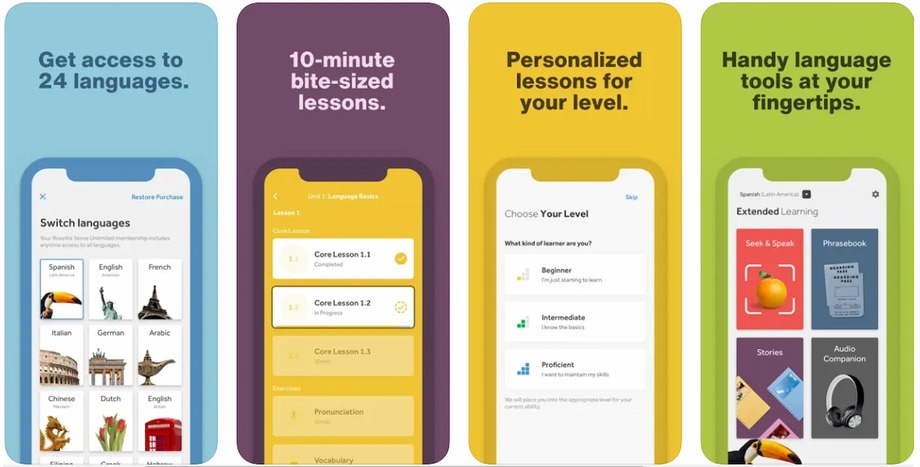
The speech recognition technology gives learners quick feedback on pronunciation. While other app features include digital flashcards, tales, and live classes, lessons also include audio recordings, graphics, and matching activities. Moreover, it provides live coaching with native speakers, so you can practice your new skills through active conversations.
Best for: those who don't mind spending money on a premium app and want the complete educational experience.
Pricing: available “Self-Study” and “Self-Study+Tutoring” plans depending on learning duration:
- Free 3-day trial
- 3 months: €11.99
- 12 months: €9.99
- Lifetime: €179
HelloTalk
With the help of the language exchange software HelloTalk, you may practice your language skills with native speakers. The language learning app offers texting, phone messaging, video conferencing, and sketching as means of communication.
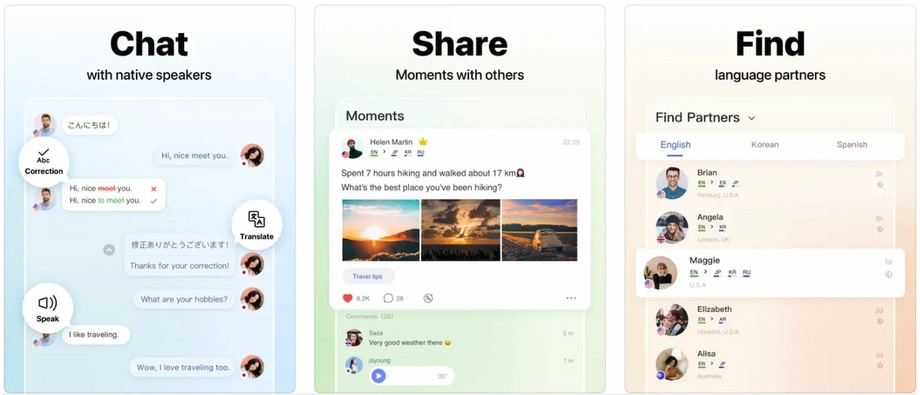
Tools are offered to translate messages and correct your companion during discussions. Users may also learn new vocabulary terms and ask questions or leave comments in the app's community.
Best for: improving conversational skills on practice
Pricing:
- Free: limited to one language, 10/day chats to initiate, translation 10 times/day
- VIP Membership: $6.99 per month, 25/day chats to initiate, unlimited translation
Drops
Drops is a vocabulary app that emphasizes the visual component of learning. The app offers 35+ languages and an aesthetically captivating interface that makes studying an enjoyable endeavor. Drops employs the drag-and-drop method, which makes the experience fun and simple.
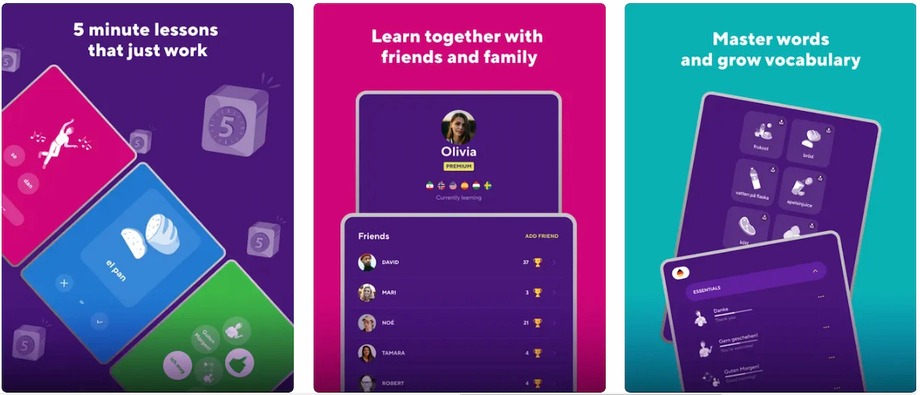
You can learn new words and phrases by listening to audio recordings, matching vocabulary terms to visuals, and putting word chunks in the right sequence. Additionally, users may monitor their development, practice challenging words, and get badges for a variety of accomplishments.
Best for: boosting vocabulary
Pricing:
- Free: limits learning to five minutes a day
- Premium Plan: $9.99 a month, provides unlimited access to all content.
FAQ
How Long Does It Take to Learn a New Language?
You may check the FSI Scale, also called Interagency Language Roundtable, due to your language to check the most accurate number of hours that learning language will take. Anyway, everyone is unique and to determine your personal duration of language learning — you need to consider your needs, the amount of time you have available for learning, and your mother tongue language to decide how long it will take you to learn a language. As knowing a language similar to your native one will simplify your study journey and vice versa.
Is There a Fast Way to Learn a New Language?
It depends basically on your needs as it can take anywhere between three months to two years to learn how to speak, write, and read in a new language fluently. To speed up the learning, you should plunge into the language.
Over to You
Learning a new language is a life-changing experience that can enhance one's personal and professional life. It can increase one's brain function, improve memory, and help to better understand different worldviews. Therefore, anyone who is curious, motivated, and willing to embrace new challenges should consider embarking on this enriching journey.